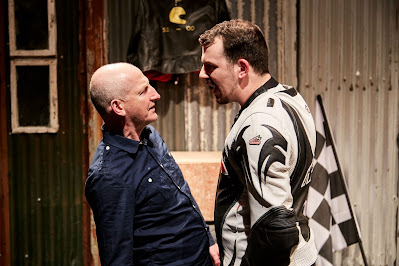Steeped in the lore and drama of road racing, Nick Snow’s play also looks at the mentality and logic of the riders. As an examination of the human condition that drives people to take extreme risks, it finds universal drama that can appeal to a non-sporting audience. A tussle between a friend who has lost too much and a rider who might not know how to stop.
Beckett (Fra Gunn) establishes that he was a close friend of Robert Dunlop, brother of Joey, and father to William and Michael. Joey, Robert and William all died in road racing accidents. In a bold move for a play about sport, Beckett’s dialogue often has the rhythm and style of an extended Shakespearean monologue, rather than a contemporary play. Lashings of Greek mythology are thrown in, with Trojan prince Hector in combat with Achilles. This kind of overwriting would often be a step too far, but describing a sport which so readily uses the language of the battlefield, it works and adds another rich layer to the story.
Andrew McCracken brilliantly conjures up the gruff and taciturn biker who doesn’t need words when communing with his machine. Michael carries not only the family name but also the legacy of their tragedy. This weight is almost tangible in the way McCracken holds himself. Michael is brusque, occasionally wry, and always deadly serious about his ability and success. McCracken shows great throttle control, shifting gears from being quiet and dismissive to almost exploding with fervour in a post-interval monologue that describes Michael’s fight with the bike.I’m not a fan of road-racing, but The Safety Catch engages and informs, and a week later it’s still vivid in my thinking. I’ve witnessed the spectacle of road racing just once in my life. As a family we headed up to Dundrod. I remember the intense sound as the bikes went past. But other than the long, straight empty roads, I’ve no actual memory of what the bikes racing past looked like, probably too small and too far back to catch much of the blur of man and machine.
A couple of years ago, I interviewed a minister who is chaplain to the road-racing community. He’d conducted the funerals of more than 20 motorcyclists. Did the ethic of a sport that kills so many participants bother him? “Yes it does, but while they make that choice I’d like to be available for them and their families. I’m not an apologist for road racing… But I respect their wish to do so … I’m not there to start the race, and I’m not there to make their bikes go quick. I’m there for them as people.”
Just as the house is victorious in the long run in a casino, we’re told that that the road wins in racing. Against those odds, Beckett asks what some in the audience are wondering: how can a rider sit on the start line knowing that to be competitive, to go that little bit faster, they will be creeping closer to the mechanical limits of their bike and the road conditions. The better you become, the more risk you carry.In the wake of a death, radio phone-in discussions rarely get any further than “it’s in the blood” when explaining why young men – and it only seems to be men on the road with women sticking to track-racing – knowingly put themselves in such danger.
But Snow’s play provides a range of deeper answers. Michael talks about sitting on the grid, believing he won’t die this time. Weighing up the odds, one race at a time, feeling confident that he can beat the road. That’s sufficient to rev up the engine and start.
The sporting commentator deliberately pulled back from covering road racing five years ago and now focuses on football. Beckett pushes back on Michael, asking whether he’s too much of a coward to consider stopping.
For the men at the top of the sport, they’re not racing against the other competitors. The real race is between man and machine. Whereas his uncle Joey is described as a beautiful rider, at one with his bikes, Michael is more brutal, taming his machine like a wild horse.
Racing enthusiasts dominated the audience at the performance I attended in the Lyric Theatre. Many that I talked to hadn’t been to a theatre before except for a family pantomime. People in the know said they recognised the portrayal of Michael Dunlop’s manner that they saw at races, they admitted that the theatrical version was necessarily far too loquacious.
Dee Armstrong has created a corrugated iron and wooden panelled set, a shed in which Michael spends most of the production servicing a bike. Director Joe O’Byrne allows The Safety Catch to pay tribute to the achievements and death of the Dunlop riders in a way that is unvarnished and never overly fawning. The scenes that open up a wooden box containing three family helmets are packed with emotion and unspoken sentiment.
While the play relies on real events, the confrontation is a work of fiction. It’s been written with the knowledge but not the active cooperation of Michael Dunlop who shuns the limelight and lets his recording of winning do the talking.
A nostalgic or uncritical conversation might have been turgid. But that’s not what the creatives and cast have produced. The Safety Catch is an extraordinary piece of theatre: intelligent, deep, funny, moving, unapologetic and very realistic about the sport and the competitors it’s describing. Hopefully the play will return with a longer run that can not only capture the enthusiasm of the racing community but also those of us for whom the need for speed is hard to fathom but the human story is completely absorbing.
Enjoyed this review? Why not click on the Buy Me a Tea button!



No comments:
Post a Comment